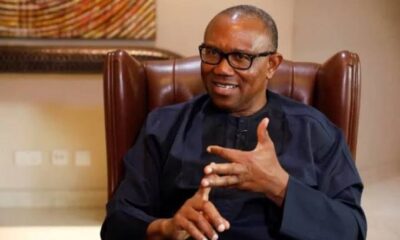News
Obi’s reaction on IBB’s confession shakes social media, says Nigeria is worse off, demands recognition of true election winners
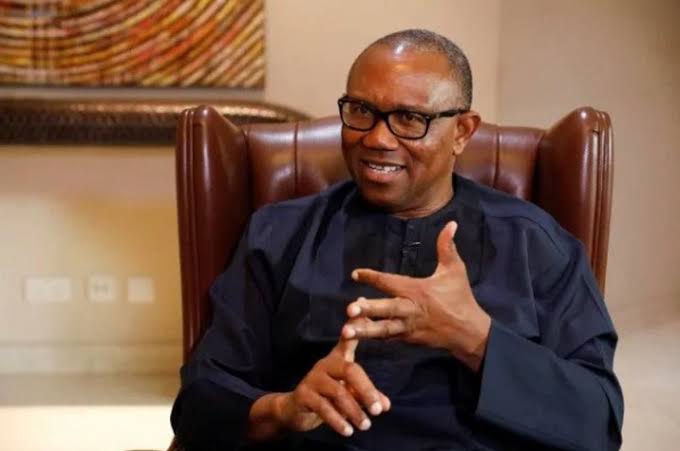
Labour Party’s presidential candidate in the 2023 election, Peter Obi, has responded to former Nigerian Military President Ibrahim Badamasi Babangida’s (IBB) recent acknowledgment that the late Chief MKO Abiola won the June 12, 1993, presidential election.
Babangida made this earth shaking revelation during the launch of his autobiography, A Journey in Service, in Abuja on Thursday. Obi praised Babangida’s admission as a crucial step toward national healing and unity.
He also expressed hope that other key players in Nigeria’s democracy would have the courage to recognize the true winners of past elections.
In his speech during the book launch, Babangida admitted that the annulment of the June 12 election was a regrettable moment in Nigeria’s history.
He stated: “That accident of history is most regrettable. The nation is entitled to expect my impression of regret. As a leader of the military administration, I accept full responsibility for all decisions taken under my watch.”
Babangida’s acknowledgment of Abiola’s victory marks a significant departure from his previous stance and has reignited conversations about Nigeria’s democratic evolution.
Peter Obi’s Reflections Peter Obi, who attended the book launch, shared his reflections on the event through a post on his verified X (formerly Twitter) account. In his statement, Obi praised Babangida’s contributions to Nigeria’s economy and efforts to foster national cohesion during his tenure. “IBB’s contributions to Nigeria’s economy and his strong support for entrepreneurship and private sector growth remain immeasurable,” Obi wrote.
He highlighted Babangida’s role in promoting substantial growth in the financial sector and creating policies aimed at strengthening Nigeria’s economic and social fabric.
Key Takeaways from the Event Obi also shared two key takeaways from the event’s keynote address and Babangida’s comments:
Nigeria’s Development Compared to Peer Nations Obi reflected on a quote from the keynote speaker, “Rien n’a changé,” which translates to “Nothing much has changed.” In the case of Nigeria, we are worse off than we were during IBB’s era.
He observed that Nigeria has stagnated in terms of human development compared to peer countries like Bangladesh, India, Vietnam, and Ghana.“When IBB left office in 1992, these countries were in the low Human Development Index (HDI) category, just like Nigeria.
Today, they have advanced to medium and high HDI levels, while Nigeria remains in the low HDI category,” Obi lamented.
Democratic Transitions in Ghana vs. Nigeria Obi praised Ghana’s democratic progress over the past 30 years, noting that the country has experienced smooth leadership transitions that reflect the genuine votes of the people. He contrasted this with Nigeria’s history of disputed electoral outcomes.“In Ghana, ruling party candidates have conceded defeat, respecting democracy in its truest form. In Nigeria, electoral outcomes often fail to reflect the people’s will,” he added.
Babangida’s Admission and Its Significance One of the most profound moments of the event, according to Obi, was Babangida’s admission that MKO Abiola won the June 12 election. Obi described the acknowledgment as a step toward national healing and progress. “IBB’s admission is a step toward national healing, unity, and progress for our nation,” Obi stated. He emphasized that recognizing the truth about past elections is essential for Nigeria to move forward with honesty and reflection.
A Call for Recognition of Past Election Winners Obi expressed hope that other key players in Nigeria’s political history would also find the courage to acknowledge the true winners of past elections. He highlighted the importance of such admissions in promoting transparency, reconciliation, and trust in Nigeria’s democratic system.
“I hope that one day, other key players in Nigeria’s democracy will find the courage to recognize the true winners of past elections, allowing our nation to tell its story with honesty and reflection,” Obi stated. This call resonates with many Nigerians who have long demanded electoral reforms to ensure free, fair, and transparent elections that truly reflect the will of the people.
Historical Context: The June 12 Election and Its Fallout The June 12, 1993, presidential election is widely regarded as one of the freest and fairest elections in Nigeria’s history. MKO Abiola, the Social Democratic Party (SDP) candidate, was on the verge of being declared the winner when the election was annulled by the military government led by Babangida. This decision led to nationwide protests and unrest, as many Nigerians saw the annulment as a betrayal of democracy. Abiola, determined to claim his mandate, declared himself president in 1994.
This act resulted in his arrest and detention by the regime of General Sani Abacha, who took power after Babangida’s exit. Abiola died in detention on July 7, 1998, under mysterious circumstances, just weeks after Abacha’s sudden death. His passing remains a dark chapter in Nigeria’s democratic journey.
Impact of Babangida’s Admission Babangida’s admission that Abiola won the June 12 election has reignited discussions about Nigeria’s democratic development and the long-term consequences of the annulled election. It has also sparked renewed calls for justice and recognition of Abiola’s contributions to Nigeria’s democracy.
Many Nigerians see the admission as an opportunity for healing and reconciliation. However, some critics argue that the acknowledgment comes too late to provide meaningful justice for Abiola and his supporters.
REACTIONS
Public Reactions to Obi’s Statement Obi’s reflections and call for the recognition of past election winners have been met with widespread reactions across social media and political circles. Supporters praised his commitment to transparency and democratic ideals, while others criticized him for not offering more concrete proposals for electoral reform. One political analyst noted, “Obi’s statement is timely. Acknowledging historical truths is essential for healing and nation-building. However, actions must follow words if Nigeria is to truly move forward.”
Government Efforts to Honor June 12 and Abiola’s Legacy In 2018, then-President Muhammadu Buhari made a significant gesture by moving Nigeria’s Democracy Day from May 29 to June 12 in honor of Abiola. This move was seen as an official acknowledgment of Abiola’s victory and a step toward reconciling the injustices of the past. Buhari also posthumously awarded Abiola Nigeria’s highest national honor, the Grand Commander of the Federal Republic (GCFR), a title traditionally reserved for sitting presidents. This act was widely praised as a long-overdue recognition of Abiola’s contributions to Nigeria’s democratic struggle. The Road Ahead: Strengthening Nigeria’s Democracy Peter Obi’s call for the recognition of true election winners is a reflection of broader concerns about Nigeria’s electoral process.
While Babangida’s admission is a step towards historical truth, many believe that systemic reforms are necessary to prevent similar injustices in the future. To strengthen Nigeria’s democracy and ensure electoral transparency, several key actions must be taken:
1. Electoral Reforms Nigeria’s electoral system has been criticized for inconsistencies, fraud, and a lack of transparency. Experts argue that adopting more rigorous voting and result collation methods—such as electronic voting and real-time result transmission—will minimize irregularities.
2. Judicial Independence in Election Disputes A major challenge in Nigeria’s democracy is the perception that judicial rulings on election disputes are often influenced by political interests. Ensuring that the judiciary remains independent and impartial is crucial for upholding the true outcomes of elections.
3. Political Will to Uphold Democratic Principles For democracy to thrive, political leaders must prioritize the integrity of the electoral process over personal and party interests. The ability of incumbents to concede defeat when necessary, as seen in Ghana and other democratic nations, should become a norm in Nigeria.
4. Civic Education and Voter Awareness An informed electorate is essential for a functional democracy. Educating Nigerians about their voting rights, the electoral process, and the importance of active civic participation can help reduce voter apathy and increase public demand for free and fair elections.
5. Recognition and Compensation for Past Electoral Injustices .
Many political and human rights groups continue to push for official recognition of past electoral injustices. While the declaration of June 12 as Democracy Day was a step in the right direction, some believe that the Nigerian government should go further by issuing a formal apology and providing reparations to the families of those who lost their lives in the struggle for democracy.
News
SAD! APC lawmaker dies while asleep

The lawmaker representing Kaura Namoda South Constituency in the Zamfara State House of Assembly, Aminu Ibrahim Kasuwar-Daji, has died.
It was gathered that the lawmaker passed on in his sleep during the early hours of Wednesday.
Aminu Ibrahim Kasuwar-Daji’s sudden death came as a shock to many in the state, especially his colleagues and political associates.
The All Progressives Congress (APC) in Zamfara, the party under which he was elected, expressed deep sorrow over his passage.
Members of the party, including the State Working Committee and other supporters, described his death as a great loss.
They said he was known for his dedication and honesty in serving his people.
His family, community members in Kaura Namoda South, and fellow lawmakers have been thrown into mourning as preparations for his burial began.
According to Islamic rites, he was buried today at 3:00 pm in his hometown of Kasuwar-Daji, located in the Kaura Namoda Local Government Area.
Many in the state have continued to express grief as they remember the role he played in representing the people and contributing to the work of the state assembly.
News
Just in: Sam Olumekun takes over as INEC’s Acting Chairman
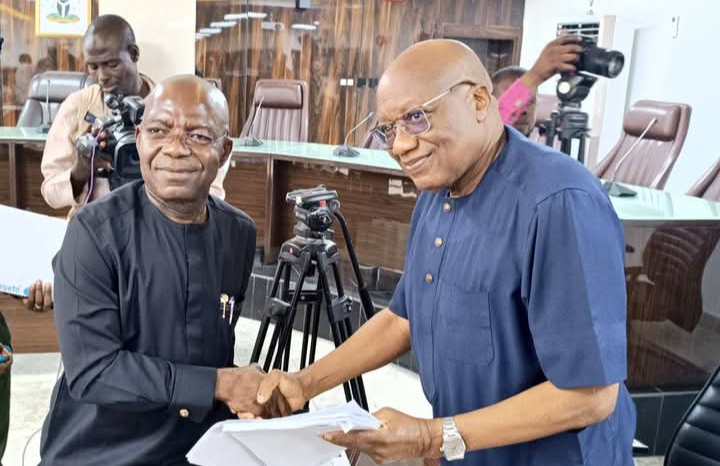
Mr. Sam Olumekun has taken over at the Independent National Electoral Commission (INEC) as Acting Chairman.
Olumekun is INEC’s National Commissioner in charge of Information and Voter Education.
He performed his first duties today, receiving a high-level delegation of the Labour Party (LP) at the Commission’s headquarters in Abuja with other National Commissioners in attendance.
The delegation was led by Abia State Governor Dr. Alex Otti, who visited the Commission to discuss key developments within the Labour Party.
It was gathered that both parties engaged in discussions centered on enhancing collaboration and reinforcing democratic values.
During the visit, Governor Otti formally presented a Certified True Copy of the recent Supreme Court judgment concerning the party’s leadership.
He noted that the meeting was aimed at fostering clarity, mutual understanding, and institutional alignment regarding the Labour Party’s current structure.
Mr. Olumekun, the Acting INEC Chairman, reaffirmed the Commission’s unwavering commitment to neutrality, transparency, and the rule of law in the discharge of its constitutional responsibilities.
Recall that a viral WhatsApp message had indicated that Prof. Mahmood was sacked by President Bola Tinubu and replaced with one Prof. Bashiru Olamilekan.
“INEC Chairman Prof. Mahmud Yakubu has been replaced with Prof. Bashiru Olamilekan by President Tinubu,” the message, which had no attribution, read. However, both INEC and the Presidency debunked the widespread report.
Yakubu, who is rounding off his second tenure in office, is expected to exit the system towards the end of this year.
The process of appointing an INEC chairman is the President nominating a candidate and forwarding his particulars to the Department of State Services (DSS) for profiling.
After such screening, the President, thereafter, takes the name to the National Council of State for its advisory review.
Based on the outcome, the President sends the name to the Senate for screening and confirmation.
News
Crude oil prices slide further, now selling below $57

Crude oil prices have dropped below $57, following a previous rate of $59.78.
This decline coincides with the imposition of tariffs on several countries by US President Donald Trump.
A report from West Texas Intermediate attributes this price slump to consistent 6% reductions observed last week.
JPMorgan Chase & Co has warned that these tariffs could likely push both the US and global economies into a recession this year.
The financial institution explained that the tariffs, set to take effect this week, are expected to have widespread economic repercussions.
Market analysts and the business community have expressed concerns about the negative implications of these measures, predicting a slowdown in economic activities and a subsequent decline in oil demand.
-
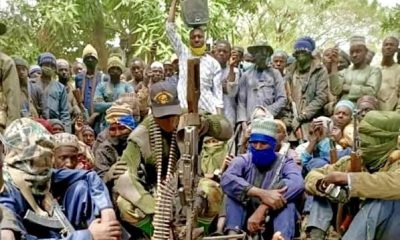
 News13 hours ago
News13 hours agoBanditry:” I was chained for 32days while in their den, killed my wife as I watch-Nat’l Assembly DD narrates experience
-

 News9 hours ago
News9 hours agoPolice Inspector Slumps, Dies While Celebrating After Arsenal Wallop Real Madrid 3-0
-

 News14 hours ago
News14 hours agoUS revokes more than 500 foreign student visas
-

 News20 hours ago
News20 hours agoBandits have seized control of 64 communities in Plateau – Gov Muftwang
-

 News16 hours ago
News16 hours agoIbas picks administrators for 23 Rivers LGs(SEE list)
-

 Economy20 hours ago
Economy20 hours agoMobile Money transactions hit $1.68trn in one year
-
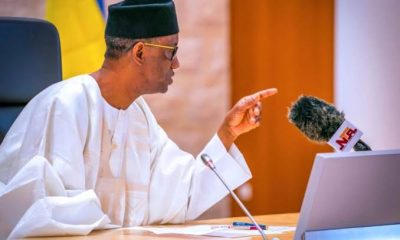
 News21 hours ago
News21 hours agoRibadu warns against ransom payment to terrorists, kidnappers, others
-

 News8 hours ago
News8 hours agoSAD! APC lawmaker dies while asleep


